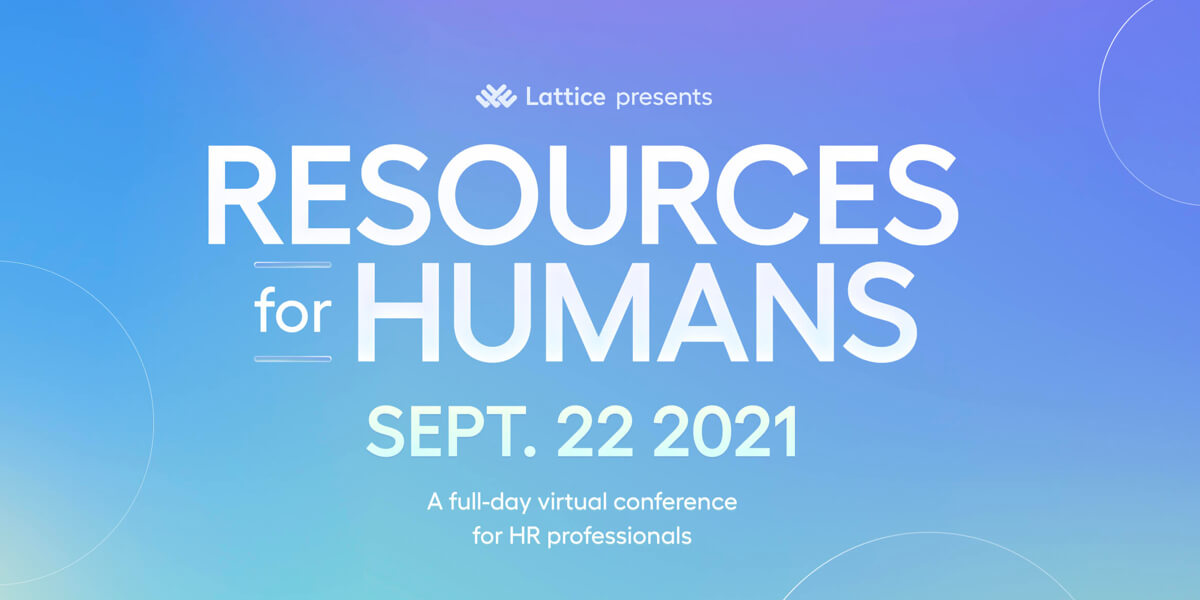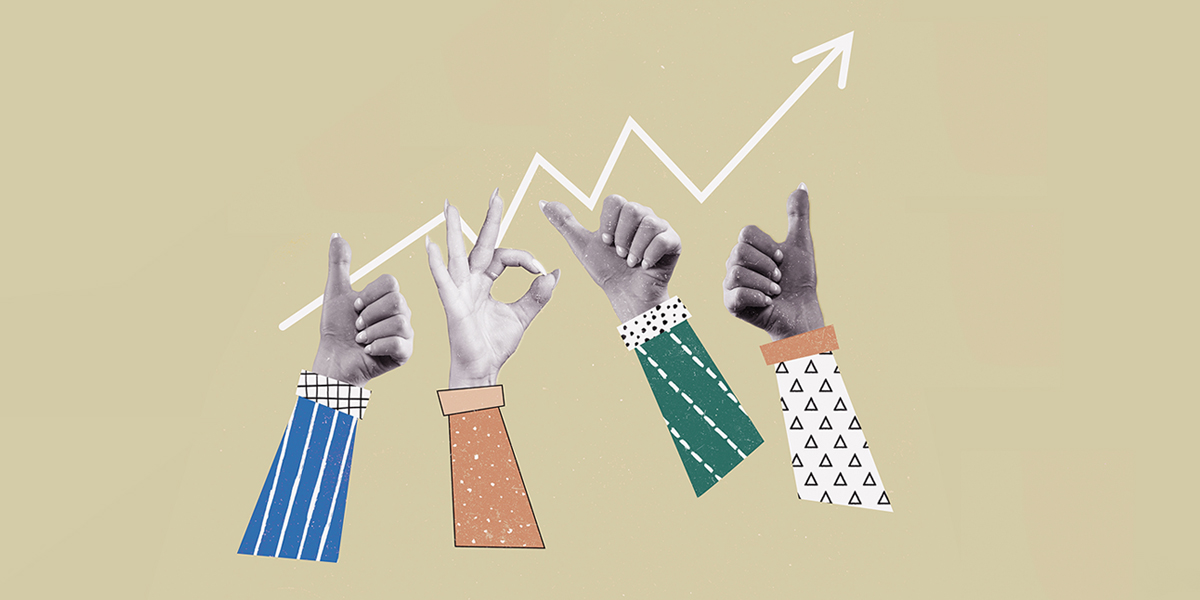On September 22, Lattice brought over 40,000 HR professionals together for our third Resources for Humans Virtual Conference. The event featured insights from over 40 inspiring leaders from some of the world’s most innovative companies. Speakers addressed topics ranging from company culture, hybrid work, engagement, and mental health.
Want to relive the event? You can rewatch the sessions on demand here. Plus, we’ve pulled together our own set of highlights and memorable moments.
1. Empathy and performance aren’t mutually exclusive.
Serena Williams is a tennis icon whose name is synonymous with power and performance. With a reputation like that, it goes without saying that she maintains high standards for herself and her team. In her keynote session, Williams explained why those high expectations don’t overshadow the importance of empathy for others, especially today.
“We're humans, right? We have to be empathetic towards each other,” Williams said, recalling a recent experience. Days earlier, her coach had requested time off to recoup after traveling for over 24 hours straight. “I'm like, ‘Don't even ask twice...Is there anything I need to do for you? You're in my side of the world, what can I do?’"
Tennis, even for individual competitors like Williams, is a team sport. She credits much of her success to the coaches, nutritionists, and other specialists behind her. And while her organization may not resemble a conventional workplace, it shares one common thread: relationships. More than any single factor, the bonds between people shape your company culture, brand, and business.
“I do believe in keeping things professional, but on my team, we're pretty much all super close friends. We're together so much out of the year, and there are long stints where it's just us and no one else,” Williams said. “When it comes to basic humanity, we just have to be humans. That should be something that we all strive to do.”
2. It’s time to normalize struggle at work.
In his session, Think Again: The Power of Knowing What You Don’t Know, Adam Grant encouraged us to rediscover our vulnerability, especially at work. While the past year gave us ample reason to reflect on burnout, loneliness, and overall mental health, it didn’t normalize talking about those issues at work. Getting there isn’t easy — which is why it takes a deliberate effort from leaders, cultural champions, and HR teams to set the example.
“For too long, we had leaders who felt that it was their job to put on a costume and cape and hide all of their weaknesses, vulnerabilities, and difficulties,” Grant said. Business leaders who regularly acknowledge their personal and professional challenges, whether it’s a bad day at work or feeling overwhelmed by a daughter’s virtual classes, indirectly encourage others to do the same.
The old saying, “Ask and you shall receive,” rings especially true when seeking support from your peers. If employees don’t feel comfortable voicing their struggles, the “givers,” as Grant calls them, aren’t equipped to step in.
“Where the givers come out of the woodwork is when somebody says, ‘Hey, I could really use some help.’ But a lot of people don't ask. They don't want to be vulnerable. They don't want to look incompetent,” Grant said. “When you as an HR leader model that behavior...it makes it easier for other people to follow your lead.”
3. Lattice unveils its next product evolution.
Lattice CEO Jack Altman opened the conference by unveiling two major product updates. First, he shared the launch of Operational Goals and a reimagining of the product’s existing OKRs functionality. New features include a Salesforce and JIRA integration, a goal-setting setup wizard, and OKR consulting by Lattice Advisory Services. You can learn more about those updates here.
But that wasn’t the biggest news he had to share. Heading into next year, Lattice is expanding its people management platform to support an entirely new category: Compensation.
“Employees want to be rewarded for the hard work they’re doing, and they want to know their colleagues are, too,” Altman said. “Compensation is a critical part of people management and an important piece of any People strategy.”
Compensation directly impacts engagement and performance and is closely intertwined with career development. But at most organizations, the decision-making process around pay can feel arbitrary, shrouded in mystery, and even subject to bias. When asked, only 24% and 27% of employees and HR leaders, respectively, believe their compensation processes are transparent or easy to understand.
“Lattice Compensation will help companies align their pay practices with their pay philosophy through tools that make compensation decisions more transparent, equitable, and easy to communicate,” he said. Long term, this product category will support compensation management, detailed views for managers and employees, and pay equity analytics.
4. Positivity is a prerequisite in People strategy.
Katarina Berg, Chief Human Resources Officer at Spotify, has been leading talent transformation at the audio streaming company since 2013 and oversaw “the band’s” growth from 900 to over 7,000 employees. In The Hard Work of Building a Culture of Belonging, she reflected on that journey and the company’s recent rollout of the work from anywhere model.
“[At first,] I saw a lot of problems rather than opportunities,” Berg said, reflecting on her initial reaction when Spotify CEO Daniel Ek pitched the distributed model years ago. Her thinking on that evolved, and not just because of the pandemic’s impact on work as we know it. “As soon as you are on more floors than one, you are distributed. As soon as you have more than one office, you are distributed. When you have 73 offices in all time zones of the world, obviously you're super distributed,” Berg said.
Berg calls experiments like work-from-anywhere examples of “controlled chaos,” and a manifestation of a company culture known for innovation. To Berg, these programs are also a sign of positive thinking. To implement innovative, people-first policies like these often requires a leap of faith. Sure, there may need to be “little tweaks,” as Berg jokingly calls them, along the way. But isn’t that journey part of the joy of working in HR at a global, fast-growing company?
“Being negative is easy...But being positive, that is real leadership. You have to be courageous enough to say, ‘I believe in this,’” Berg said. “Being nice is pretty cool. And being optimistic or positive? That is true leadership.”
5. HR’s role comes at an emotional cost.
People teams took center stage throughout the pandemic and this year’s shift toward hybrid work. As Lattice CEO Jack Altman said, “As HR leaders, you played a huge role — maybe the biggest role — in helping to guide our people and our companies through it all, helping us adapt and even thrive through those changes.”
As a result, People leaders like Tiffany Steveson, Chief People Officer at Patreon, have been asked to shoulder so much more. “What's so interesting about the times that we're operating in...is that the world is dictating what’s needed from human capital,” Steveson said. “And the most successful leaders are those who are thinking about humans — not with this ‘resources’ mindset — but as the humans who come to work and crush it every day for you,” she said in a panel discussion, Building the Next-Generation HR Team.
Co-panelist Lucia Gillory, VP of People & Places at Virta Health, agreed. “Combined with just the number of things that have been happening in the world, this is elevating the People function and is making it clear that it’s critical to organizations’ success,” Gillory said.
Still, this added importance creates new stressors. “This is one of the loneliest jobs that you can do, being a people leader. People are coming to you with their challenges, with their hardships… and there's no place to put those feelings and those thoughts and the things that you're trying to process,” she added.
Resources for Humans community speaker Chloe Sesta Jacobs, Global Director of Inclusion and Engagement at Deputy, shared that sentiment. “Two years ago, before we knew what COVID was, a lot of people in HR thought that it was their responsibility to bottle up their emotions at work, and put on a more stoic front.” But even during periods of intense change, she stressed that HR leaders can “continue to channel that passion for what we do without it consuming our entire lives, and compromising both our mental and physical health.”
Her big takeaways for leaders feeling that same pressure? “Balance isn't sustainable or achievable. We need to shift our mindset and reframe our thinking about achieving work-life balance, and instead, move towards a culture of work-life integration,” she said.
“Emotions are not good or bad, they just are. Allow yourself to feel how you're feeling, and don't be afraid to show up in your role with openness and vulnerability. Chances are your openness and vulnerability will encourage someone else to do the same.”
—
Those were just some of the highlights from this year’s virtual conference. Rewatch the sessions on demand here.
Want to keep the conversation going? Resources for Humans is a Slack community of over 15,000 HR leaders who believe the best way to impact a business is through its humans. Together, we help each other navigate challenges by sharing resources and firsthand experiences. Click here to learn more about the free community.







